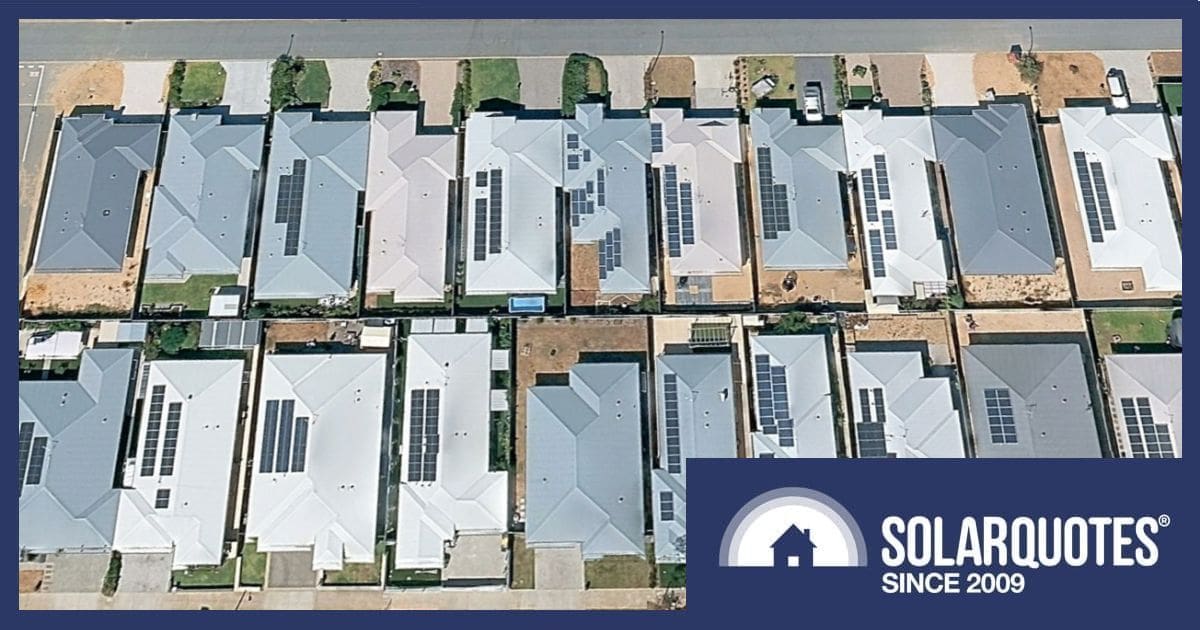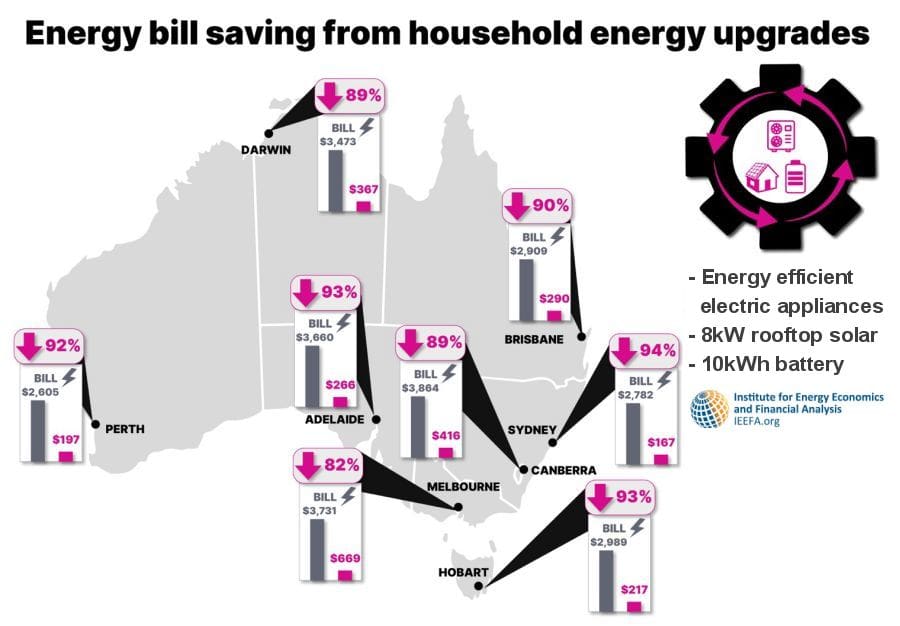
Policy debate in Australia concerned with addressing rising energy costs has largely centred on the wrong solutions says a new report – the focus should be on homes, not power plants.
While solar power has put downward pressure on electricity prices, this has been offset by increases in gas and coal prices, coal-fired clunkers becoming increasingly unreliable, and rising network costs. Assistance such as energy bill rebates, while welcome, are a sugar hit and don’t address the underlying issues.
A new report from the Institute for Energy Economics and Financial Analysis (IEEFA) says three significant elements are keeping energy prices elevated.
- Many households continue to rely on expensive gas.
- Most homes use energy inefficiently.
- Most household energy consumption occurs when the sun isn’t shining.
The report’s author, Energy Finance Analyst Jay Gordon, says reducing the energy households draw from the grid and using it in a smarter way is one of the most effective ways to reduce energy costs.
“Our findings show that deep energy bill reductions can be enabled through the household energy upgrades we recommend in our report,” says Gordon. “Household energy upgrades could form the core of a federal and state government strategy to halve household energy bills.”
Among the recommendations made in the report is focusing on solutions such as boosting uptake of energy-efficient electric appliances such as heat pump hot water systems, load-shifting — and of course solar power systems and home batteries.
Even More Savings With Thermal Efficiency
The report also makes the point that while having solar panels, home batteries and energy efficient appliances are all well and good, thermally efficient homes could unlock even further savings and better utilise that equipment.
Many Australian homes, particularly older stock, are notorious for thermal efficiency. The National Home Energy Rating Scheme (NatHERS) rates the thermal efficiency of Australian homes on a scale of 0 to 10, with 10 stars the most efficient. Although pegging the average rating of existing homes is difficult due to poor data, it’s around 2 stars says the report.
As an example of how much of an impact thermal efficiency can have, a 7-star home in Melbourne is likely to consume about two thirds of the energy of a 2-star home. The minimum NatHERS rating for new homes in most of Australia these days is 7 stars.
By boosting thermal efficiency, pre-heating and pre-cooling a home become viable and will contribute to increased load-shifting to times of the day when the sun is shining and grid electricity is cheaper. This would result in not only consumer savings, but significant mains grid demand reduction.
Virtual Power Plants Need More Scrutiny
The report also touches on the role of Virtual Power Plants (VPPs), stating the financial implications of participation is difficult due to limited information on how operators manage batteries.
“There is a risk that batteries are operated in a way that benefits the operator but not the consumer, and it is difficult for consumers to understand if they will receive a net benefit from signing up to a VPP.”
The report says more regulation may be needed, and as a matter of urgency given their tie-in with battery rebates.
SolarQuotes’ Ronald Brakels recently published a couple of articles on VPPs – one examining if battery owners should join a VPP, and the other about the potential difficulties, issues, and traps of Virtual Power Plant programs.
A National Energy Efficiency Rebate Scheme
While some states have their own energy efficiency programs, the report recommends a comprehensive, national incentive scheme should be implemented; and among other actions:
- Minimum energy performance standards expanded and increased.
- Fairer electricity pricing structures (consumption and exports) for consumers; rewarding efforts to reduce peak demand.
- A review re-evaluating energy network cost recovery approaches.
So, how could a national energy efficiency rebate scheme be integrated? The report offers two suggested approaches.
The first is to expand and extend Australia’s Small-scale Renewable Energy Scheme (SRES) to provide a broad-based incentive to households to reduce energy consumption and peak demand. The SRES is the program providing the framework for solar panel rebates and more recently, the national battery rebate; both of which can knock thousands of dollars off the costs of installing those systems.
Alternatively, another approach could be working with New South Wales and/or Victoria to expand their energy upgrade schemes to other states and territories. New South Wales has its Peak Demand Reduction Scheme (PDRS), and Victoria has the long-running Victorian Energy Upgrades (VEU) initiative.
“Decision-makers must consider the barriers that have historically blocked households from taking up cost-effective energy upgrades, and past experience of policies that have proved to be successful,” states the report’s conclusion. “A combination of improved standards for household appliances, and comprehensive, consistent rebate schemes are likely to drive much higher uptake of the upgrades discussed in this report.”
The full report, titled “A focus on homes, not power plants, could halve energy bills”, can be accessed here.
On a related note, a round-up of what’s currently on offer across Australia in terms of solar and energy efficiency incentives can be found on our rebates and subsidies page.


 RSS - Posts
RSS - Posts



How about linking energy efficiency upgrades to negative gearing on established properties? Make the receipt of negative gearing contingent on performing energy efficiency upgrades. Maybe it could be used to foster industry such that we finally get reasonably priced locally manufactured double glazed windows.
The article refers to the web page at
https://www.solarquotes.com.au/energy-efficiency/appliances/
Perhaps, that web page could be updated, so that, in the section with the heading “Washing Machines And Dryers”, the recommendation is made, to replace vented clothes dryers with heat pump dryers. I have used vented clothes dryers, for decades, and, a year or so ago, I bought a (the model is now deprecated) heat pump dryer, and, am pleasantly surprised at the benefits, for a number of reasons. in addition to the improved efficiency, the load (the instantaneous power consumption ) is significantly less than for a vented dryer – about a kilowatt less, so, imposing a significantly less load on the circuit and the household circuitry. And, it does not expel humid air. So, I recommend the use of heat pump dryers, to replace vented dryers.
Perhaps, the subsidising of replacing vented clothes dryers, with heat pump dryers, could be done by state governments, to help reduce grid loads.
Where did you find that aerial picture of houses without black roofs?
Do Australians think that they are exempt from the laws of physics?
Fashionable or not, BAN THEM!
BdH
Tuross Head